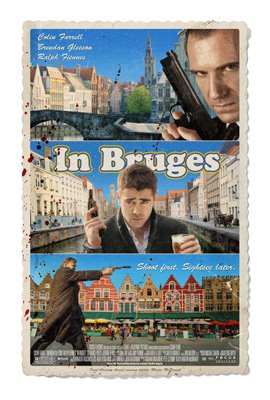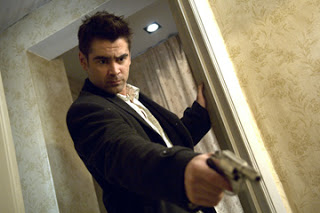 “In Bruges” is hiding out in theaters now. Supervisor Julian Slater helped populate the soundtrack of the quaint medieval town. Slater supervised the hilarious “Hot Fuzz” last year and had another release this past weekend with “The Other Boleyn Girl”. Mixing took place at Hackenbacker Audio Post in London with Nigel Heath dubbing with Oliver Brierley assistning. Nigel, also of “Hot Fuzz” fame proved his versatility bouncing from re-recording mixer to foley mixer to dialog recordist over the past couple of years. Alistair Crocker shot production sound for “In Bruges”. Crocker’s current work will be heard in the TV show “Sharpe’s Peril”. Composer Carter Burwell lent his talents to the film, tracking the score at Angel Studios in London. Burwell, a Coen Brothers mainstay is currently working on their next, “Burn After Reading”. A consistent blogger, Burwell has samples and some notes on his work for “In Bruges”, HERE.
“In Bruges” is hiding out in theaters now. Supervisor Julian Slater helped populate the soundtrack of the quaint medieval town. Slater supervised the hilarious “Hot Fuzz” last year and had another release this past weekend with “The Other Boleyn Girl”. Mixing took place at Hackenbacker Audio Post in London with Nigel Heath dubbing with Oliver Brierley assistning. Nigel, also of “Hot Fuzz” fame proved his versatility bouncing from re-recording mixer to foley mixer to dialog recordist over the past couple of years. Alistair Crocker shot production sound for “In Bruges”. Crocker’s current work will be heard in the TV show “Sharpe’s Peril”. Composer Carter Burwell lent his talents to the film, tracking the score at Angel Studios in London. Burwell, a Coen Brothers mainstay is currently working on their next, “Burn After Reading”. A consistent blogger, Burwell has samples and some notes on his work for “In Bruges”, HERE.
Thanks to sound supervisor Julian Slater for taking time out to do this Q and A!
DS: How did director Martin McDonagh’s theater background influence his thoughts on sound in this film?
JS: Martin, more than many of the directors I have worked with is extremely focused on the dialogue in the film. Being a playwright, he is obviously a man who sees the sound effects and maybe even the music as secondary to the words in his film. As for looping, he will do everything he can to avoid looping dialogue or adding new dialogue for that matter. As far as he is concerned, what he captures on the day is what he wants to go out in the cinema.
DS: In a film with so many different accents, did any actor stray away from their role’s dialect? How often does that happen in film, and is looping the only solution to bring cohesiveness back to a performance?
JS: In ‘In Bruges’ it wasn’t really an issue. With Martin’s desire to capture the performance on the day shot, he made sure that all the accents were tuned in on set. I have been involved with other films where that is not the case though. Of course the editor will fish around for takes that will bring the most to the performance and indeed the accent but when this avenue is exhausted, looping is the one option left where you have the ability to start again so to speak. This can make for a tricky looping session and you must be very careful how you communicate with the actor that there accent needs to be or can be improved!
DS: During the film, Bruges as a city is viewed as a fairy tale and at the same time, a nightmare. Was there any specific direction in presenting the town sonically and did it differ with point of view?
JS: Very much so! Having worked on the film for a few weeks, the effects editor and myself trotted off to Bruges for a few days to record the ambiances. We were immediately struck with how different it sounded compared to how it looks in the film. Watching the film you get the impression that it is very quiet and almost idyllic in its overall sound but not so. Bruges, like most places today has heavy traffic, sirens and many other modern day noises that we have all gotten used to. There are sounds that are specific to Bruges such as the many clock towers with their bells chiming and we did record these but on a Sunday morning at 5am! In effect we did a ‘Sonic Lie’ in the final mix and made the town sound much quieter and peaceful than it actually is.
DS: Speaking of dramatic change in sound, how did your approach differ between “In Bruges” and last year’s loud and proud “Hot Fuzz”?
JS: Chalk and Cheese! Edgar is a very different director to Martin. With Edgar, the sound design and the layering of sounds is another tool at his disposal to take the film to another level. Edgar is a machine gun of ideas and he is constantly firing them at me! Its great fun because all the time we are trying different sound ideas on different scenes to see what direction we can take it. Also, the sounds have to be justifiable with a comic twist. You can’t just lay a bar atmosphere in a bar; there has to be elements which to some degree will make you laugh with the action on screen or add to it in some way. Without a doubt Edgar is the most sonically demanding director I work with but the pay off is you get to produce stuff that is very unique and fun to watch and make!

DS: When was the idea to use sound puns in “Hot Fuzz” mocking action movie clichés conceived? Did you guys do any research for accuracy in the mockery?
JS: That came from Edgar at the outset. He gave me the generic conceit and we, as a sound team developed it. Looping Simon in the action scenes to make him sound over the top macho was an example of this. We tried to pay homage to Michael Bay and Bruckheimer in the film a lot. It wasn’t always easy as “Hot Fuzz” is essentially a Hollywood high budget action film comedy with the real budget and confines of a small to medium British film!
DS: What was your first gig like?
JS: Hehe, I feel like every gig is my first gig! As every film is unique and has its own set of challenges I really do feel like I am starting out for the first time every time. I always make sure that whatever challenges I have in a certain movie, I take the solutions with me to the next project. I never relax into the job and I have learned that that is a good thing.